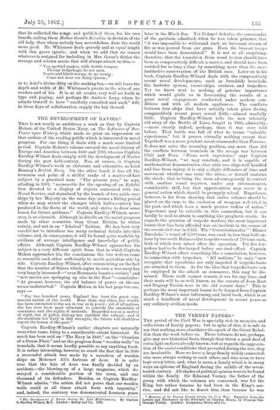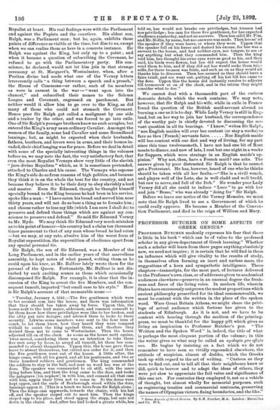THE VERNEY PAPERS.*
THE period of the Civil War is specially rich in memoirs and collections of family papers ; but in spite of this, it is safe to say that nothing more elucidates the epoch of the Great Rebel- lion than the work before us. These volumes do not, perhaps, give any new historical facts, though they throw a good deal of extra light on facts already known ; but as regards the apprecia- tion of the social conditions that prevailed during the war, they are invaluable. Here we have a large family widely connected, who were always writing to each other, and who seem to have kept every letter, and, what is more, a family which is in many ways an epitome of England during the middle of the seven- teenth century. All shades of political opinion were to be found within the family. Sir Edmund Verney, the father of the group with which the volumes are concerned, was for the King, but rather because he had been in the King's ser- vice, and did not like to desert him, than because he was • Memoirs of the Verney Family during the Civil War. Compiled from the Letters and Illustrated by the Portraits at Claydou House, by Frances Par- thenope Verney. London : Longman', Green, and Co.
Royalist at heart. His real feelings were with the Parliament and against the Papists and the courtiers. His eldest son, Ralph, was a Parliament man ; but he, again, exhibits those points of difference so visible at the time, but dim to us, except when we can realise them as here in a concrete instance. Sir Ralph was against the King, but only up to a point ; and when it became a question of subscribing the Covenant, he refused to go with the Parliamentary party. His con- science, he declared, would not let him join in that strange ceremony at St. Margaret's, Westminster, when, after a Puritan divine had made what one of the Verney letters irreverently calls " a thing between a speech and a preach,"
the House of Commons—or rather, such of its members as were in earnest in the war — " went upon into the
chancel," and subscribed their names to the Solemn League and Covenant, engrossed on parchment. But neither would it allow him to go over to the King, as did many of those who could not stomach the Covenant.
Hence poor Sir Ralph got called a malignant by one side and a traitor by the other, and was forced to go into exile. One of Sir Ralph's younger brothers knew no such scruples, but entered the King's army as an ordinary Cavalier. Amongst the women of the family, some had Cavalier and some Roundhead leanings; but, as might be expected when their husbands, fathers, brothers, and lovers were in arms, and their homes in- vaded, their chief longing was for peace. Before we deal in detail with some of the specially interesting things in the volumes before us, we may note the fact, the very satisfactory fact, that even the most Royalist Verneys show very little of the slavish " jure- divino Royalism" which, as it is sometimes pretended, attached to Charles and his cause. The Verneys who espouse the King's side do so from reasons of high politics, and because
they think it is on the whole the best for the country, and not because they believe it to be their duty to obey slavishly a lord and master. Even Sir Edmund, though he thought himself specially bound to the King because he had been in his service, spoke like a man " I have eaten his bread and served him near
thirty years, and will not do so base a thing as to forsake him ; and choose rather to lose my life (which I am sure I shall do) to preserve and defend those things which are against my con- science to preserve and defend." So said Sir Edmund Verney to Mr. Hyde. We may think Sir Edmund very much mistaken as to his point of honour—his country had a claim ten thousand times paramount to that of any man whose bread he had eaten —but we may, at any rate, absolve him of the worst form of Royalist superstition, the superstition of obedience apart from any special personal tie.
Sir Ralph, the son of Sir Edmund, was a Member of the Long Parliament, and in the earlier years of that marvellous assembly, he kept notes of what passed, writing them as he could upon his knee, as Mr. Balfour lately wrote them for the perusal of the Queen. Fortunately, Mr. Balfour is not dis- turbed by such exciting scenes as those which occasionally discomposed Sir Ralph. For example, it is clear that the in- cursion of the King to arrest the five Members, and the con- sequent tumult, imparted "but small ease to his style." Here is Sir Ralph's account of that memorable scene :-
" Tuesday, January 4, 1641.—The five gentlemen which were to bee accused cam into the house, and there was information that they should bee taken away by force. Uppon this, the house sent to the lord maior, aldermen, and common councell to let them know how there priviledges were like to bee broken, and the citty put into dainger, and advised them to looke to there security. Likwise some members s% ere sent to the four inns of court, to let them know, how they heard they were tampred withal' to assist the king against them, and therfore they desierd them not to come to Westminster. Then the house adjorned till on of the clock. As soone as the house mett again, 'twas moved, considering there was an intention to take these five men away by force, to avoyd all tumult, let them bee com- manded to absent themselves. Uppon this, the hc,use gave them leave to absent themselves, but entred noe order for it, and then the five gentlemen went out of the house. A little after, the kinge came, with all his guard, and all his pentioners, and two or three hundred soldiers and gentlemen. The king commanded the soldiers to stay in the hall, and sent us word hee was at the dore. The speaker was commanded to sit still, with the mace lying before him, and then the king came to the dore, and tooke the palsgrave [bis nephew] in with him, and comand all that cam with him, uppon their lives not to come in. So the doses were kept oppen, and the earle of Roxborough stood within the dore, leanings uppon it. [This is a touch we have from Sir Ralph alone.] Then the kinge cam uppwards, towards the chaire, with his hat off, and the speaker steped out to meet him. Then the kinge steped upp to his place. and stood uppon the stepp, but sate not down in the chaire. And, after hee had looked a greate while, hee
told us, hee would not breaks our priviledges, but treason bad noe priviledge ; hee cam for those five gentlemen, for hoe expected obedience yeasterday, and not an answere. Then hee calld Mr. Pim, and Mr. Hollis, by name, but noe answere was made. Then hee as' ed the speaker if they were heere, or where they were. Uppon that the speaker fell on his knees and desierd his excuse, for hee was a servant to the house, and had neither eyes, nor tongue, to see or say anything but what they commanded him. Then the king told him, hee thought his owne eyes were as good as his, and then said, his birds were flowen, but hee did expect the house would send them to him, and if they did not hee would seeke them hitt- selfe, for there treason was foule, and such an on as they would all thanke him to discover. Then hee assured us they should have a faire trial!, and soe went out, putting off his hat till hee came to the dore. Uppon this the house did instantly resolve to adjorne till toomorrow at on of the clock, and in the intrim they might consider what to doe."
We cannot deal with a thousandth part of the curious domestic details which the work contains. We may note, however, that Sir Ralph and his wife, while in exile in France found the question of the British maid-servant abroad as burning a one as it is to-day. While Lady Verney is still in Eng- land, but on her way to join her husband, the correspondence of the worthy pair is chiefly devoted to discussing the ser- vant question in all its bearings. " I know," writes Sir Ralpt, "noe English maides will ever bee content (or stay a weeke) to fare as thes [French] servants faire Noe English maide will bee content with our diet and way of liveing, for my part since this time twelvemonetb, I have not had one bit of Rost meats to dinner, and now of late, I rost but one night in a weeke for Sappers, which were strainge in an English maide's op- pinion." Why not, then, have a French maid? one asks. The answer given by poor distracted Sir Ralph is that he cannot get a Protestant. He has, however, heard of one who he thinks should be taken with all her faults,—" She is a civill wench, and playes well of the Lute, she is well cladd and well bredd, but raw to serve, and full of the Itch." No wonder poor Lady Verney did all she could to induce " Luce " to go with her and join " Besse," who was already " doing for " Sir Ralph.
Before we leave our notice of the Verney Memoirs, we must note that Sir Ralph lived to see a Government of which be could really approve. He became a Member of the Conven- tion Parliament, and died in the reign of William and Mary.



































 Previous page
Previous page